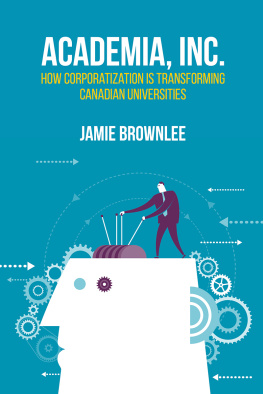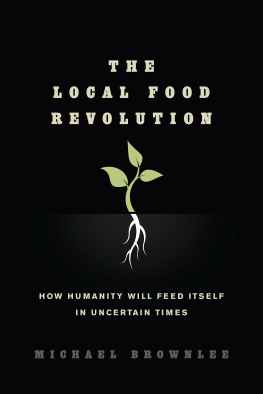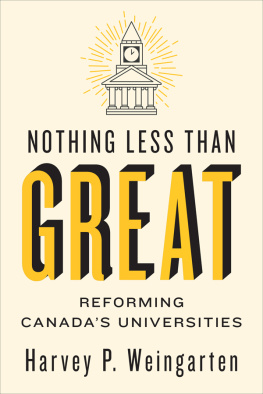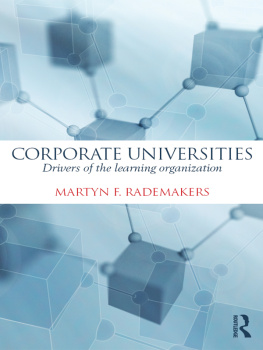ACADEMIA, INC.
HOW CORPORATIZATION IS TRANSFORMING
CANADIAN UNIVERSITIES
JAMIE BROWNLEE
ACADEMIA, INC.
FERNWOOD PUBLISHING HALIFAX & WINNIPEG
Copyright 2015 Jamie Brownlee
All rights reserved. No part of this book may be reproduced or transmitted in
any form by any means without permission in writing from the publisher,
except by a reviewer, who may quote brief passages in a review.
Editing: Jessica Antony
Cover design: John van der Woude
Printed and bound in Canada
Published by Fernwood Publishing
32 Oceanvista Lane, Black Point, Nova Scotia, B0J 1B0
and 748 Broadway Avenue, Winnipeg, Manitoba, R3G 0X3
www.fernwoodpublishing.ca
Fernwood Publishing Company Limited gratefully acknowledges the financial support
of the Government of Canada through the Canada Book Fund and the Canada Council
for the Arts, the Nova Scotia Department of Communities, Culture and Heritage,
the Manitoba Department of Culture, Heritage and Tourism under the
Manitoba Publishers Marketing Assistance Program and the Province of Manitoba,
through the Book Publishing Tax Credit, for our publishing program.
Library and Archives Canada Cataloguing in Publication
Brownlee, Jamie, author
Academia, Inc. : how corporatization is transforming Canadian
Uuniversities / Jamie Brownlee.
Includes bibliographical references and index.
Issued in print and electronic formats.
ISBN 978-1-55266-735-4 (pbk.).--ISBN 978-1-55266-752-1 (epub)
1. Education, Higher--Economic aspects--Canada. 2. Education,
Higher--Research--Economic aspects--Canada. 3. Universities and
colleges--Economic aspects--Canada. 4. Academic-industrial
collaboration--Canada. 5. Business and education--Canada.
6. Corporatization--Canada. I. Title.
LC1085.4.C3B76 2015 338.4337871 C2015-900675-9
C2015-900676-7
CONTENTS
ACKNOWLEDGEMENTS
BETWEEN CAPITALISM AND DEMOCRACY:
REFLECTIONS ON CANADAS GOLDEN AGE
ACKNOWLEDGEMENTS
W riting about Canadian universities was a highly personal experience, as I have been part of the university system for my entire adult life. During this time, I have counted on a number of close friends and colleagues. Thanks to Chris, Kevin, Dale and Robyn for their intellectual support and companionship. And to my PhD supervisor, Wally who has long been a source of academic inspiration thanks for your guidance and your kindness.
It is, once again , an honour to work with the people at Fernwood. A huge thanks to Wayne Antony, whose insights greatly improved the book. Thanks also to Jessica Antony for skillfully editing the final draft; Beverley Rach and Debbie Mathers for production layout and design; and John van der Woude for cover design.
My family has always been a tremendous source of encouragement, especially my parents Dale and Rod. Thank you for everything you have done for me. And thanks to my uncle Doug, who, as a corporate CEO , has forced me to better defend my arguments through our regular debates. Thanks also to my partners family, especially the Almdals for the good times and Rodney for always pushing me to get er done. My most heartfelt thanks go to Salena. In addition to being my dance partner and a constant source of love and good humour, she is the most gifted editor I know. Her intellectual contributions were indispensable to improving the quality of this book.
I have always believed, and still do, that public universities are unique and irreplaceable institutions. They are amazing places. I want to thank the students and faculty of this generation, and the next, who are actively working to oppose the corporatization of universities in Canada and around the world.
CHAPTER ONE
THE CORPORATE TAKEOVER OF THE UNIVERSITY
I n 2012, Quebec students undertook a series of protests opposing the provincial governments planned tuition increases . The 75 percent fee hike was included in the budget of the Liberal government of Premier Jean Charest. These protests quickly expanded into a broader popular movement and province-wide student strike. On May 22, 2012, the one-hundredth day of the strike, demonstrations took place across the province with students staging a massive rally in Montreal that brought hundreds of thousands of activists into the streets. CLASS , the student federation leading the strike movement, described the march as the single biggest act of civil disobedience in Canadian history (Mennie et al. 2012). During the uprisings, Quebec students faced police repression, thousands of arrests and a new law aimed at criminalizing dissent. The provisions of the new law contravened the Quebec and Canadian charters of rights, and included unprecedented restrictions on public protest activity (Annis 2012).
Quebec s striking students received widespread support from parents, teachers, unions, public sector workers and university professors. One of the groups involved in the movement was Angry Mothers in Solidarity, who launched frequent and spontaneous marches. High school students also staged solidarity walkouts and had a strong presence in the demonstrations. Nightly casserole protests (marked by the banging of pots and pans from apartment balconies and streets) and neighbourhood assemblies took place across the province, with solidarity rallies also being held across Canada and in other countries. This high level of support for the Quebec students resulted from the fact that the movement became, over time, a larger social and political struggle against educational commodification and a new social and economic vision of Canadian society (Camfield 2012).
Similar student movements have surfaced in other parts of the world. In 2009, for example, the most dramatic U.S. student mobilizations since the 1970s took place, with thousands of California university students taking part in a mass walk-out and a series of occupations across the entire University of California system (Wollan and Lewin 2009). These protests were in response to a decision to increase tuition fees and other cutbacks to universities, which followed a series of similar actions that had already compromised a post-secondary system once known as one of the finest in the world. Also in 2009, universities in France were disrupted by strikes and occupations in opposition to President Nicolas Sarkozys proposed neoliberal reforms, while student groups in Austria occupied university classrooms for an entire semester to contest university financing proposals. Two years later in Greece, hundreds of schools and university departments came under student occupation as the government faced mounting opposition to its higher education agenda (Marseilles 2011). Perhaps the most visible confrontations over university restructuring in Europe took place in 2010 in England, where citizens and activists aggressively challenged austerity measures, such as funding cuts to higher education and proposed tuition increases of nearly 300 percent (Coughlan 2010). These events are only a small sample of the wide range of education-based activism taking place around the world.


















